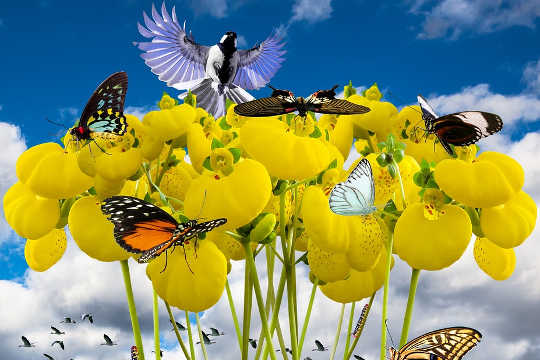
Image by Gerhard Gellinger
For as long as I can remember I’ve been told there are two things we can count on in this world: that everything changes, and that there always will be a certain amount of suffering in life. I’ve found that the changes are not always evident, nor the suffering constant, but both are typically present at times of crisis.
We have all faced a crisis at some point in our lives. As you know, they come in all shapes and forms. If a crisis results from an act of nature, like a tornado, earthquake, or hurricane, their impact will be obvious. Hopefully, you’ll have ensured your physical safety, battened down the hatches, and picked up the pieces of your life afterwards.
Non-Physical and Less Evident Crises
But the majority of crises are not so obvious and may not threaten our lives or affect our basic survival. Many take their toll on a more intimate level. Their consequences can be less physically evident and difficult for others to appreciate, unless they’ve had similar life experiences.
Crises that are more intimate and less physically perceptible can result from the death of a loved one, sudden unemployment, legal struggles, personal isolation, loss of self-direction, the ending of a relationship, or the inability to find meaning in what we do.
Other crises arise from even less evident causes. They result from our own internal perceptions. These subjective experiences can feel foreign or threatening, and because they also may conflict with what culture accepts as real based on shared experiences, they might lead us to question our sanity.
Our Ability To Cope With A Crisis
Each of us has different levels of ability in how we adjust to crisis. For instance, if faced with the death of a loved one, we may have varying capacities to emotionally come to terms with that loss. Some may not be able to reconcile the many feelings that get stirred.
But reconciling feelings that result during a crisis is only one area of functioning where we can be challenged to heal. We might also be challenged physically, intellectually, or spiritually, for example.
Our ability to cope with a given crisis will depend on how well those areas were functioning before the crisis. If some were lacking earlier, and that deficient area is required to heal, then adjusting to its impact will be that much more of a struggle. But there’s an upside to that struggle.
For instance, if we suddenly lost someone we loved, we likely would have a host of different feelings. They could be feelings of sadness, fear, anger, or a combination of all. If our ability to identify and express any or all of our feelings was limited before the loss, and we have to learn how to experience them in order to heal, then the suffering caused by the crisis will have prompted us to gain that needed emotional growth.
However, if in the aftermath of a crisis we have the opportunity, resources, and inclination to pursue such growth, then the effort will not only contribute to our overall adjustment, it will also bring forth needed personal development that can benefit us thereafter. That’s how a crisis can serve as a Chrysalis Crisis.
The Chrysalis Crisis
I use the analogy of the chrysalis to describe the kinds of crises that can be used for growth and transformation because I believe that the chrysalis stage of a caterpillar’s transformation into a butterfly best captures the conditions and requirements of achieving such potentials from crises.
The transformation of the caterpillar into a butterfly has a long history of being used to represent the awakening of our psychological and spiritual potentials. Christians have employed it for centuries. St. Teresa paralleled the silkworm’s slow transformation out of the darkness of its cocoon to represent the human journey out of what her protégé, St. John of the Cross, called a “Dark Night of the Soul.” She saw that journey out of darkness as a necessary stage on route to further awakening the soul.
The early Greeks also drew a relationship between personal transformation and spiritual evolution. They even used the same word to denote soul and butterfly.
The Transformative Potential Of A Crisis
I decided to use the chrysalis metaphor to describe the transformative potential of a crisis for three specific reasons. First, like the caterpillar in the chrysalis stage, we’re vulnerable when we’re going through a crisis. Once the caterpillar surrounds itself in a cocoon, it’s defenseless. It can be invaded and devoured by insects. It can get blown down from its dangling hold, or when ready to open, it can be blocked by an object. Unfortunately, should any of these situations occur, they can lead to tragic outcomes from which it can’t recover.
We also can be met with insurmountable consequences from certain kinds of crises, and when that’s the case, we, too, may not recover. But if we do, then there’s a second reason why I believe the chrysalis metaphor applies.
During the chrysalis stage, the caterpillar undergoes the internal process of metamorphosis, a phase where it liquefies and literally melts down. This stage reflects a process we can go through following a crisis. After we survive and overcome its initial impact, our adjustment also will entail a certain amount of internal changes. But during that period, we too may feel as if we’re going through our version of a meltdown.
To pursue the potential for growth and transformation that lies beyond that adjustment requires an additional effort. It requires the willingness to engage in the struggle for growth. Let me provide you with another example.
Recall those early teen years when you or someone near to you went through what Anna Freud called, “the storm and stress of adolescence.” Prompted by raging hormones, early adolescence tends to be a challenging time in our development as we learn to identify, understand, and manage the expression of our emotions.
Now imagine if that stage of emotional development never was sufficiently mastered. Imagine if instead of being helped to identify, understand, and modulate the expression of your feelings, you were told you shouldn’t have them, that some were bad, or you were ridiculed for their expression. Can you also imagine how over time you might learn to unwittingly keep them out of your own awareness, even when certain circumstances might warrant their experience?
If this were the case, how would you come to terms with the many feelings that can get prompted by a crisis? Like the butterfly attempting to break free from its cocoon, you certainly would have a struggle on your hands. But also like the butterfly, once you gained that emotional growth, it would serve you for the rest of your flight through life.
In this way, a Chrysalis Crisis can be like a stress test from the universe. It can lead to the development of key areas of functioning that will be available for similar crises in the future. However, beyond the assurance of being adequately prepared for a similar future crisis, developing critical areas of needed growth can provide other opportunities as you move through life. They can be used to awaken and expand awareness.
A Crisis Can Present Danger and Opportunity
Like the dual meaning the Chinese attribute to their word for crisis, a Chrysalis Crisis can present danger and opportunity. In a Chrysalis Crisis, the danger comes from the initial threat of the crisis; the opportunity lies in its potential to prompt growth and development.
Should your life be met with a crisis, it too can hold such possibilities. But in order to determine if it has the potential to be a Chrysalis Crisis, you’ll need to give it further examination. At a point when you feel that the initial shock and impact have been absorbed, you’ll want to start by asking a few self-reflective questions.
First, in adjusting to this crisis, have I discovered areas of my personal development that appear to need additional growth or understanding? If certain areas stand out, then I would ask a second question: How can I gain this increased development? And finally, a third: Can this kind of growth be achieved independently, or would it be more successfully attained if I sought outside help and assistance?
As I’ve indicated, a crisis may or may not hold the potential to be a Chrysalis Crisis. But when it does, and the opportunity to achieve significant developmental growth can come about as a result, then in my opinion, deriving that benefit can leave you feeling less victimized by its ordeal. While it may be a small consolation, you would at least gain some satisfaction if it awakened you to certain areas of needed growth. Then, if attained, the ordeal won’t feel as if it were some random painful event that led to no apparent good.
If you have to contend with the suffering of a crises, why not let it serve as a Chrysalis Crisis? Let its fire temper the steel of your development. Let it prompt you to become stronger than you were before. If you have to accept the inevitability of the change it thrusts upon you, harness its momentum. Let it catalyze your progress along a path of growth and transformation.
Making Heavenly Lemonade Out Of The Hellish Lemons Of Life
Yes, I’m aware that to some of you this may sound a little too much like attempting to make heavenly lemonade out of the hellish lemons of life. You may think it’s too optimistic to suggest that the change and suffering accompanying a crisis can actually provide “opportunities” for positive transformation.
I recognize that personal development may not be your first priority when facing a crisis. And I’m not naïve to the many kinds of devastating crises that can occur in people’s lives. But when I, as a clinical psychologist, see much of that suffering displayed in the confines of my office, I’m continually amazed at the resilience of the people who share that pain with me: how they not only succeed in diminishing its sting but use it to prompt their growth.
Even if my optimistic encouragement motivates you to consider the possibilities for growth in your crises, you may still ask: Why bother? Where is all this development and transformation leading? Do I have to use this crisis as grist for my growth mill? Why not just get through the ordeal and put it behind me as quickly as possible?
These are legitimate questions and they’re certainly worth considering. Their answers are critical to justifying the effort because using a crisis as a Chrysalis Crisis is clearly not an endeavor everyone will elect to undertake—nor should they feel they must. There’s no one right way one ought to adjust to a crisis. Pursuing personal growth is a choice at any time. And while it may be an occupational bias that leads me to encourage that choice, I truly believe it’s one worth making.
Good Things Can Come From Crisis Situations
I’ve facilitated and witnessed scores of clients gain significant benefits from the efforts they made adjusting to crises. I’ve seen them make dramatic changes afterwards. As a result, they not only reinstated a sense of balance and harmony into their lives but actually seemed personally and spiritually deepened by the experience.
Certainly, most would not want to go through their ordeal again, but as inconceivable as it may sound, many will acknowledge that if it wasn’t for the crisis, and the choice they made to use it as a Chrysalis Crisis, much of what they needed to learn might never have come to their attention.
I’ve found that when a particular area of personal growth is needed to resolve a crisis, understanding what constitutes that growth, and what’s entailed in achieving it, can effectively be illuminated in the context of a crisis. Different kinds of crises focus and dramatize particular areas of growth. One kind of crisis can reveal how lacking a certain area of development may have caused it to arise, while another will show how the absence of particular area of development undermined the individual’s adjustment.
Sometimes good things can come from crisis situations.
©2019 by Frank Pasciuti, Ph.D.
All Rights Reserved. Excerpted with permission.
Publisher: Rainbow Ridge Books..
Article Source
Chrysalis Crisis: How Life's Ordeals Can Lead to Personal & Spiritual Transformation
by Frank Pasciuti, Ph.D.
 Recovering from a life ordeal?be it the death of a loved one, a divorce, loss of a job, or a serious physical injury or sickness?can sometimes result in personal and spiritual growth. When it does, Dr. Frank Pasciuti calls the transformative experience a "Chrysalis Crisis." If properly managed, these kinds of crises can result in increased physical, emotional, intellectual, social, and moral development. This book offers a model of human development that enables everyone?not just those in crises?to transform their lives, and create for themselves an increased sense of peace, happiness, and well-being. (Also available as a Kindle edition.)
Recovering from a life ordeal?be it the death of a loved one, a divorce, loss of a job, or a serious physical injury or sickness?can sometimes result in personal and spiritual growth. When it does, Dr. Frank Pasciuti calls the transformative experience a "Chrysalis Crisis." If properly managed, these kinds of crises can result in increased physical, emotional, intellectual, social, and moral development. This book offers a model of human development that enables everyone?not just those in crises?to transform their lives, and create for themselves an increased sense of peace, happiness, and well-being. (Also available as a Kindle edition.)
Related Books
About the Author
 FRANK PASCIUTI, PhD. is a licensed clinical psychologist and certified hypnotherapist. He is founder and president of the Associated Clinicians of Virginia, where he provides psychotherapy and organizational development services to individuals and businesses. Dr. Pasciuti is chairman of the Institutional Review Board at The Monroe Institute, and he collaborates on research related to NDEs, psychic phenomena, and the survival of consciousness at the University of Virginia School of Medicine's Division of Perceptual Studies. Visit his website at frankpasciuti.com/
FRANK PASCIUTI, PhD. is a licensed clinical psychologist and certified hypnotherapist. He is founder and president of the Associated Clinicians of Virginia, where he provides psychotherapy and organizational development services to individuals and businesses. Dr. Pasciuti is chairman of the Institutional Review Board at The Monroe Institute, and he collaborates on research related to NDEs, psychic phenomena, and the survival of consciousness at the University of Virginia School of Medicine's Division of Perceptual Studies. Visit his website at frankpasciuti.com/




























